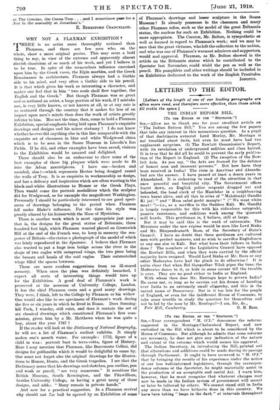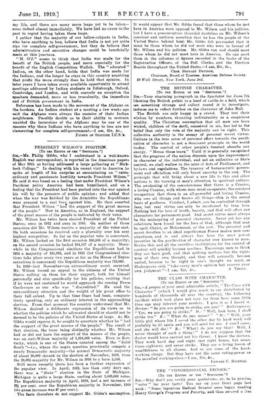[To THE EDITOR OP THE " SPECTATOR."]
Sm,—Your correspondent "M. 07." denounces the reformr suggested in the Montagu-Chelmsford Report, and now embodied in the Bill which is about to be considered by the House of Commons. But although he admits that some reforms are necessary, he does not give any indication of the nature and extent of the reforms which would secure his approval.
The Indian Secretary, in introducing the Bill, pointed out that alterations and additions could be made during its passage through Parliament. It ought to have occurred to "M. O'J." that by bringing the results of his experience under the notice of our lose well-informed legislators, through the correspon- dence columns of the Spectator, he might materially assist in the production of an acceptable and useful Act. I warn him, however, that he must recognize that whatever changes may now be made in the Indian system of government will sooner or later be followed by others. We cannot stand still in India any more than we have hitherto done in this country. We have been taking " leaps in the dark " at intervals throughout my life, and there are many more leaps yet to be taken— some indeed alined immediately. We have had no cellos in the past to regret having taken these leaps.
I gather that the majority of our fellow-subjects in India, who have anything to lose, believe that India is not yet quite ripe for complete self-government, but they do believe that administrative and executive changes could be beneficially made at this juncture.
"M. O'J." seems to think that India was made for the benefit of the British people, and more especially for the benefit of the English Competition Wallah. The " educated " Indian, on the other hand, holds that India was made for the Indians, and the longer he staye in this country acquiring that prefix the more strongly does he hold that opinion. In later years I have taken every available opportunity to attend meetings addressed by Indian students in Edinburgh, Oxford, Cambridge, and London, and with scarcely an exception the speakers demanded, more or less truculently, the immediate end of British government in India.
Referenoe has been made to the movement of the- Afghans on the borders. An Indian student at a meeting a few weeks ago said the Afghans were always the enemies of their Indian neighbours. Possibly doubts as to their ability to restrain unaided the incursions of the Afghans may be one of the reasons why those Indians who have anything to lose are not clamouring for complete self-government—I am, Sir, tec., FATHER OF Scornsu 1.0.5.'5.







































 Previous page
Previous page